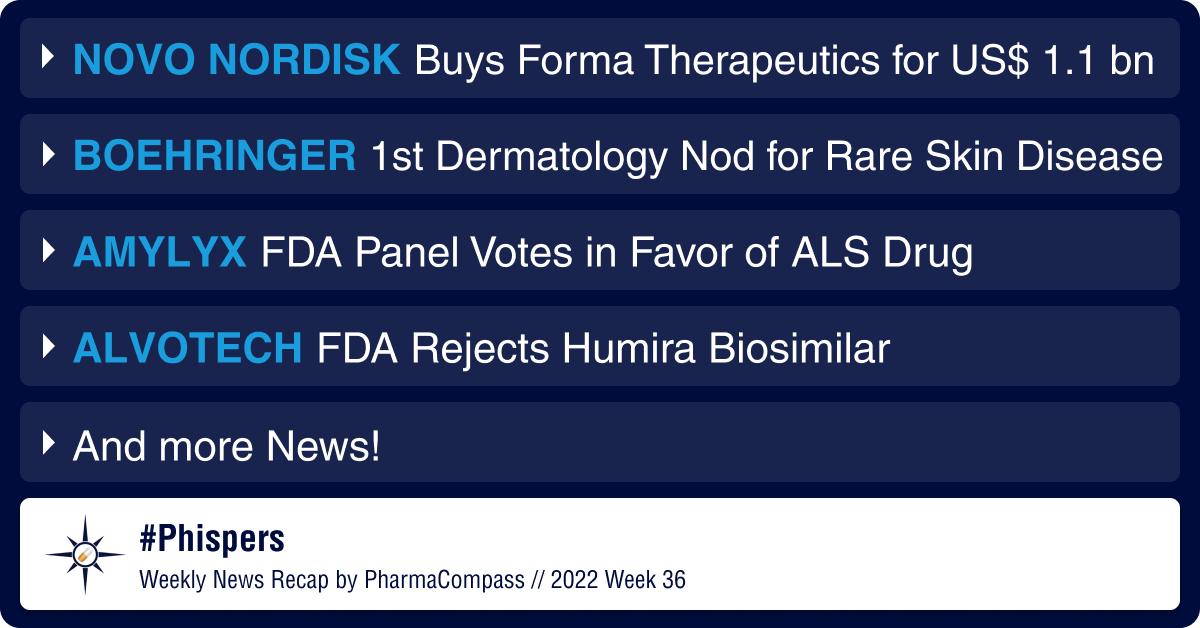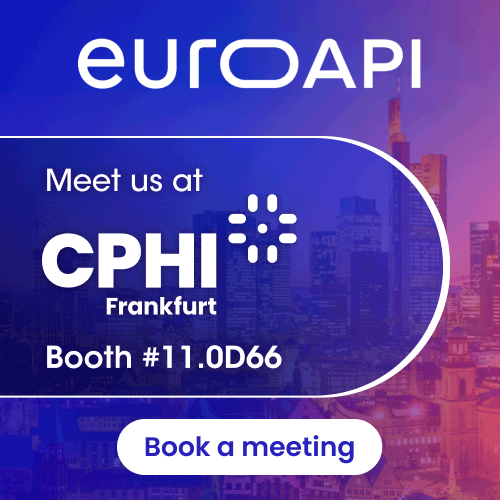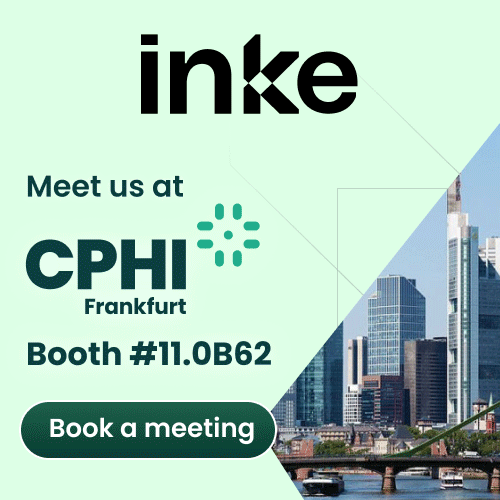
By PharmaCompass
2022-09-08
Impressions: 1,303
In pharma news this week, Novo Nordisk has agreed to buy Forma Therapeutics for US$ 1.1 billion in cash, paying US$ 20 per share. The buyout will help Novo expand its sickle cell disease drug portfolio. Meanwhile, Roche has entered into a multi-project target discovery collaboration with UK-based biotech PhoreMost.
In approvals, the US Food and Drug Administration (FDA) has approved Boehringer Ingelheim’s Spevigo (spesolimab) for generalized pustular psoriasis (GPP) flares in adults, making it the first drug to be approved for the indication. This is also the first dermatology drug by Boehringer to receive an approval.
The agency has also approved AstraZeneca’s Imfinzi (durvalumab) and gemcitabine-cisplatin chemotherapy combo to treat locally advanced or metastatic biliary tract cancer, making it the first immunotherapy treatment to be cleared for this aggressive cancer type. Meanwhile, the National Institute for Health and Care Excellence (NICE) has decided not to recommend Lynparza for NHS coverage in BRCA-positive prostate cancer. According to NICE, the drug was “not cost-effective at its current price.
After rejecting Amylyx Pharmaceuticals’ amyotrophic lateral sclerosis (ALS) drug – AMX0035 – in March, a panel of external advisers to the FDA have ruled in favor of the drug as the drugmaker has submitted new data to prove its efficacy.
In compliance news, the FDA has issued a Form 483 with two observations to Alembic Pharmaceuticals’ injectable facility (F-3) located at Karkhadi in the Indian state of Gujarat. It had conducted the inspection between August 18 and 30. The agency has also issued a complete response letter (CRL) to Iceland-based drugmaker Alvotech, rejecting its application to approve a biosimilar of AbbVie’s blockbuster drug Humira. The agency had found deficiencies at Alvotech’s manufacturing plant in Reykjavik, Iceland, during an inspection in March.
Novo to buy Forma Therapeutics for US$ 1.1 bn to expand its sickle cell disease portfolio
Last month, Pfizer had acquired blood disorder drugmaker Global Blood Therapeutics (GBT) for US$ 5.4 billion to bolster its sickle cell med portfolio. And September began with the news that Novo Nordisk, best known for its diabetes and weight loss meds, has decided to bet on 15-year-old biotechnology firm Forma Therapeutics to expand its sickle cell disease drug portfolio.
The Danish drugmaker has agreed to buy Forma for US$ 1.1 billion in cash, paying US$ 20 per share – a premium of 92 percent over the Massachusetts-based firm’s volume-weighted average price per share over the past 30 days.
The deal will give Novo access to Forma’s lead candidate etavopivat, which is in a phase 2/3 sickle cell trial. The drug is also being evaluated in a phase 2 trial in patients with transfusion-dependent sickle cell disease and thalassemia. The oral drug candidate has snagged FDA’s fast track, rare pediatric disease and orphan drug tags.
Novo will also pick up some prostate cancer, acute myeloid leukemia and glioma drug candidates along with preclinical programs in hematological diseases and cancer. The pharma is funding the buyout by dipping into its financial reserves. It expects the deal to close in the fourth quarter of this year.
Roche taps UK biotech for drug discovery: Roche has entered into a multi-project target discovery collaboration with UK-based biotech PhoreMost. Under the terms of the agreement, PhoreMost will deploy its Siteseeker phenotypic screening platform to identify disease-relevant pathways in hematology and immunology as determined by Roche. Once PhoreMost has identified the targets, Roche will take over to validate and characterize them. The British biotech will receive an undisclosed amount as upfront payment and will be eligible for preclinical milestone payments.
Boehringer Ingelheim scores its first dermatology approval for rare skin disease
The FDA has approved Boehringer Ingelheim’s Spevigo (spesolimab) for generalized pustular psoriasis (GPP) flares in adults, making it the first drug to be approved for the indication. This is also the first dermatology drug by Boehringer to receive an approval.
GPP is a rare and life-threatening skin condition that causes eruptions of painful blisters and can trigger heart failure, renal failure or sepsis. The disease afflicts one in every 10,000 people.
The FDA nod is based on data from a phase 2 trial on 53 patients. In the 12-week trial, 54 percent of the participants showed no visible pustules after receiving one 900-mg dose of the intravenous drug, as compared to only 6 percent in the placebo arm. Spevigo also cleared or almost cleared the skin in 43 percent patients compared to only 11 percent in the placebo arm.
Boehringer is also conducting a trial of the IL-36 receptor inhibitor as a maintenance treatment to prevent flares as well as other skin diseases such as palmoplantar pustulosis and hidradenitis suppurativa. The drug is also under review in Europe and a decision is expected by the end of this year.
The nod gives Boehringer an edge over AnaptysBio, which is developing a med for the same indication. The San Diego company’s drug candidate, imsidolimab, is undergoing a phase 3 trial. Results are expected by the end of 2023.
Tastes success in late-stage trial of rare pediatric lung disease: Boehringer Ingelheim said data from a late-stage trial of Ofev (nintedanib) supports the use of the drug as a treatment for fibrosing interstitial lung disease in children and adolescents between the ages of six and 17 years. The trial results showed that a weight-based dosing regimen of Ofev in the age group resulted in a dose exposure similar to adults, supporting the use of the dosing regimen in children. If approved, Ofev will become the first approved treatment for pediatric patients suffering from fibrosing interstitial lung disease. Ofev, which received its first approval as a treatment for idiopathic pulmonary fibrosis in adults in 2014, raked in US$ 1.48 billion in the first half of this year.
Vertex’s cystic fibrosis pill approved for infants: Vertex’s blockbuster cystic fibrosis pill Orkambi has received an add-on FDA approval to treat toddlers between the ages of 12 and 24 months who are homozygous for the F508del mutation in the cystic fibrosis transmembrane conductance regulator (CFTR) gene. Orkambi was first approved in the US for ages two years and older with two copies of the F508del mutation in 2015. It is now available in more than 30 countries. Cystic fibrosis is a rare, life-shortening genetic disease affecting more than 83,000 people globally.
In a rare turnaround, FDA’s advisory panel votes in favor of Amylyx’s ALS drug
In March, a panel of external advisers to the FDA had voted six to four against Amylyx Pharmaceuticals’ amyotrophic lateral sclerosis (ALS) drug saying the study data failed to establish that it was effective against the disease.
Now, in a second meeting, the advisory panel has reversed its previous decision, ruling in favor of the drug. The panel voted seven to two in favor of Amylyx’s oral drug – AMX0035 – after concluding that the evidence submitted by the drugmaker is enough to clear it for the US market.
The panel’s decision swung in favor after Amylyx provided new data which indicated that the drug could extend life expectancy by around 10 months compared to a placebo, along with biomarker data from a study in Alzheimer’s disease. The advisers also heard testimonies from clinicians and patients, a majority of whom advocated for AMX0035. The FDA is likely to give its verdict on the drug by the end of this month.
Astra’s Imfinzi plus chemo becomes first immunotherapy for biliary tract cancer
The FDA has approved AstraZeneca’s Imfinzi (durvalumab) and gemcitabine-cisplatin chemotherapy combo to treat locally advanced or metastatic biliary tract cancer, making it the first immunotherapy treatment to be cleared for this aggressive type of cancer.
The agency’s nod is based on a 685-patient phase 3 trial that showed the treatment suppressed the risk of death by 20 percent compared to chemotherapy alone. After two years, around 25 percent of patients treated with the Imfinzi combo were still alive, compared to 10 percent survival rate among patients treated with chemo alone.
The combo also ensured better progression-free survival, cutting the risk of disease progression by around 25 percent. AstraZeneca expects to extend Imfinzi’s indications as a treatment for first-line non-small cell lung cancer (NSCLC) drug along with liver and bladder cancer.
Astra’s Lynparza denied NHS coverage in BRCA+ prostate cancer: The National Institute for Health and Care Excellence (NICE) has decided not to recommend Lynparza for NHS coverage in BRCA-positive prostate cancer. According to NICE, the drug was “not cost-effective at its current price.”
The indication, in metastatic BRCA-positive prostate cancer following prior hormonal therapy, has already been rejected twice by NICE. And both times it was rejected because of its cost.
FDA rejects Alvotech’s Humira biosimilar over manufacturing issues
The FDA has issued a complete response letter (CRL) to Iceland-based drugmaker Alvotech, rejecting its application to approve a copycat version of AbbVie’s blockbuster drug Humira. The rejection came after the agency found some deficiencies at Alvotech’s manufacturing plant in Reykjavik, Iceland, during an inspection in March. The agency has asked Alvotech to correct the deficiencies before it can launch the drug in the US.
The drugmaker said it plans to fix the deficiencies before the December deadline the FDA has set for the approval of the biosimilar. The agency will also decide whether or not to designate Alvotech’s drug, AVT02, as an interchangeable med that can be substituted for Humira.
Alvotech plans to launch its biosimilar drug on July 1, 2023. AVT02 has been approved by regulators in Canada, the EU, and several non-EU European countries. Under a deal with Alvotech, generic drugmaker Teva will sell AVT02 in the US.
Alembic’s India facility slapped with FDA’s Form 483 with two observations
The FDA has issued a Form 483 with two observations to Alembic Pharmaceuticals’ injectable facility (F-3) located at Karkhadi in the Indian state of Gujarat. The agency had conducted the inspection between August 18 and 30.
None of the observations are related to data integrity, the drugmaker said. Alembic is preparing a response to the observations and plans to submit it to the FDA within the stipulated time.
The PharmaCompass Newsletter – Sign Up, Stay Ahead
Feedback, help us to improve. Click here
Image Credit : Phisper Infographic by SCORR MARKETING & PharmaCompass license under CC BY 2.0
“ The article is based on the information available in public and which the author believes to be true. The author is not disseminating any information, which the author believes or knows, is confidential or in conflict with the privacy of any person. The views expressed or information supplied through this article is mere opinion and observation of the author. The author does not intend to defame, insult or, cause loss or damage to anyone, in any manner, through this article.”








